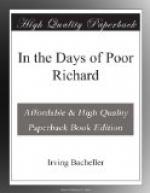Mr. Binkus paused again to put another coal on his pipe. Then he listened a moment and looked up at the rocks above their heads, for they were camped in a cave at the mouth of which they had built a small fire, in a deep gorge. Presently he went on:
“I found a heap o’ Injuns at Swegache—Mohawks, Senekys, Onandogs an’ Algonks. They had been swappin’ presents an’ speeches with the French. Just a little while afore they had had a bellerin’ match with us ’bout love an’ friendship. Then sudden-like they tuk it in their heads that the French had a sharper hatchet than the English. I were skeered, but when I see that they was nobody drunk, I pushed right into the big village an’ asked fer the old Senecky chief Bear Face—knowin’ he were thar—an’ said I had a letter from the Big Father. They tuk me to him.
“I give him a chain o’ wampum an’ then read the letter from Sir Bill. It offered the Six Nations more land an’ a fort, an’ a regiment to defend ’em. Then he give me a lot o’ hedge-hog quills sewed on to buckskin an’ says he:
“’You are like a lone star in the night, my brother. We have stretched out our necks lookin’ fer ye. We thought the Big Father had forgot us. Now we are happy. To-morrer our faces will turn south an’ shine with bear’s grease.’
“Sez I: ’You must wash no more in the same water with the French. You must return to The Long House. The Big Father will throw his great arm eround you.’
“I strutted up an’ down, like a turkey gobbler, an’ bellered out a lot o’ that high-falutin’ gab. I reckon I know how to shove an idee under their hides. Ye got to raise yer voice an’ look solemn an’ point at the stars. A powerful lot o’ Injuns trailed back to Sir Bill, but they was a few went over to the French. I kind o’ mistrust thar’s some o’ them runnygades behind us. They’re ‘spectin’ to git a lot o’ plunder an’ a horse apiece an’ ride ’em back an’ swim the river at the place o’ the many islands. We’ll poke down to the trail on the edge o’ the drownded lands afore sunrise an’ I kind o’ mistrust we’ll see sign.”
Jack Irons was a son of the much respected John Irons from New Hampshire who, in the fertile valley where he had settled some years before, was breeding horses for the army and sending them down to Sir William Johnson. Hence the site of his farm had been called Horse Valley.
Mr. Binkus went to the near brook and repeatedly filled his old felt hat with water and poured it on the fire. “Don’t never keep no fire a-goin’ a’ter I’m dried out,” he whispered, as he stepped back into the dark cave, “’cause ye never kin tell.”
The boy was asleep on the bed of boughs. Mr. Binkus covered him with the blanket and lay down beside him and drew his coat over both.
“He’ll learn that it ain’t no fun to be a scout,” he whispered with a yawn and in a moment was snoring.
It was black dark when he roused his companion. Solomon had been up for ten minutes and had got their rations of bread and dried venison out of his pack and brought a canteen of fresh water.




